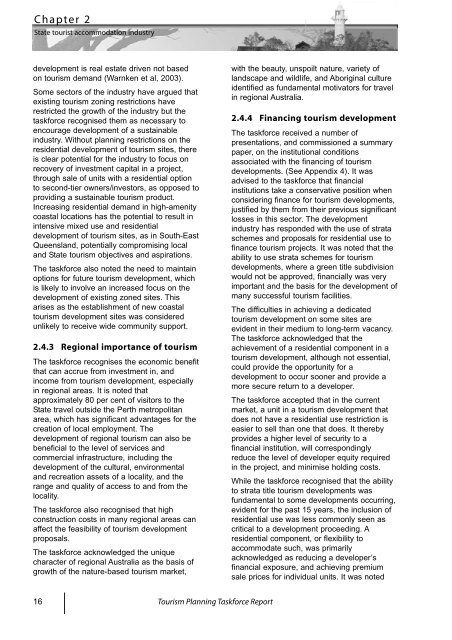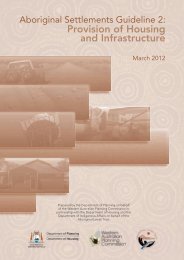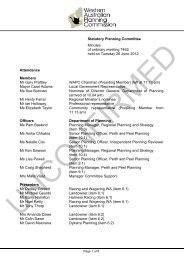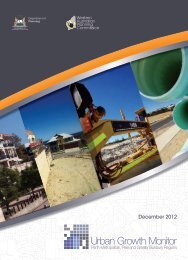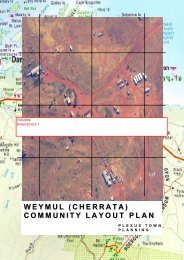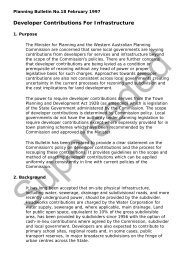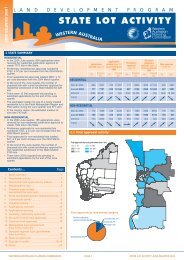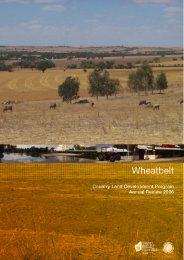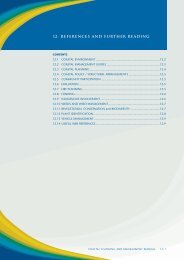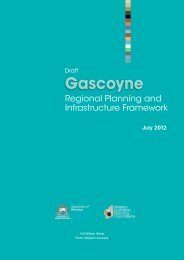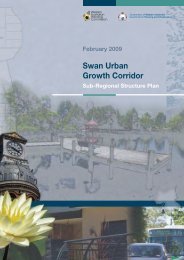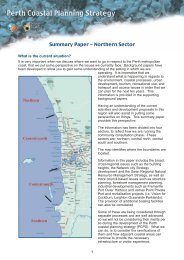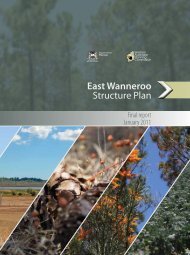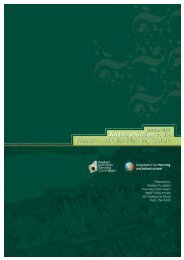Tourism Planning Taskforce Report - Western Australian Planning ...
Tourism Planning Taskforce Report - Western Australian Planning ...
Tourism Planning Taskforce Report - Western Australian Planning ...
- No tags were found...
Create successful ePaper yourself
Turn your PDF publications into a flip-book with our unique Google optimized e-Paper software.
Chapter 2State tourist accommodation industrydevelopment is real estate driven not basedon tourism demand (Warnken et al, 2003).Some sectors of the industry have argued thatexisting tourism zoning restrictions haverestricted the growth of the industry but thetaskforce recognised them as necessary toencourage development of a sustainableindustry. Without planning restrictions on theresidential development of tourism sites, thereis clear potential for the industry to focus onrecovery of investment capital in a project,through sale of units with a residential optionto second-tier owners/investors, as opposed toproviding a sustainable tourism product.Increasing residential demand in high-amenitycoastal locations has the potential to result inintensive mixed use and residentialdevelopment of tourism sites, as in South-EastQueensland, potentially compromising localand State tourism objectives and aspirations.The taskforce also noted the need to maintainoptions for future tourism development, whichis likely to involve an increased focus on thedevelopment of existing zoned sites. Thisarises as the establishment of new coastaltourism development sites was consideredunlikely to receive wide community support.2.4.3 Regional importance of tourismThe taskforce recognises the economic benefitthat can accrue from investment in, andincome from tourism development, especiallyin regional areas. It is noted thatapproximately 80 per cent of visitors to theState travel outside the Perth metropolitanarea, which has significant advantages for thecreation of local employment. Thedevelopment of regional tourism can also bebeneficial to the level of services andcommercial infrastructure, including thedevelopment of the cultural, environmentaland recreation assets of a locality, and therange and quality of access to and from thelocality.The taskforce also recognised that highconstruction costs in many regional areas canaffect the feasibility of tourism developmentproposals.The taskforce acknowledged the uniquecharacter of regional Australia as the basis ofgrowth of the nature-based tourism market,with the beauty, unspoilt nature, variety oflandscape and wildlife, and Aboriginal cultureidentified as fundamental motivators for travelin regional Australia.2.4.4 Financing tourism developmentThe taskforce received a number ofpresentations, and commissioned a summarypaper, on the institutional conditionsassociated with the financing of tourismdevelopments. (See Appendix 4). It wasadvised to the taskforce that financialinstitutions take a conservative position whenconsidering finance for tourism developments,justified by them from their previous significantlosses in this sector. The developmentindustry has responded with the use of strataschemes and proposals for residential use tofinance tourism projects. It was noted that theability to use strata schemes for tourismdevelopments, where a green title subdivisionwould not be approved, financially was veryimportant and the basis for the development ofmany successful tourism facilities.The difficulties in achieving a dedicatedtourism development on some sites areevident in their medium to long-term vacancy.The taskforce acknowledged that theachievement of a residential component in atourism development, although not essential,could provide the opportunity for adevelopment to occur sooner and provide amore secure return to a developer.The taskforce accepted that in the currentmarket, a unit in a tourism development thatdoes not have a residential use restriction iseasier to sell than one that does. It therebyprovides a higher level of security to afinancial institution, will correspondinglyreduce the level of developer equity requiredin the project, and minimise holding costs.While the taskforce recognised that the abilityto strata title tourism developments wasfundamental to some developments occurring,evident for the past 15 years, the inclusion ofresidential use was less commonly seen ascritical to a development proceeding. Aresidential component, or flexibility toaccommodate such, was primarilyacknowledged as reducing a developer’sfinancial exposure, and achieving premiumsale prices for individual units. It was noted16 <strong>Tourism</strong> <strong>Planning</strong> <strong>Taskforce</strong> <strong>Report</strong>


